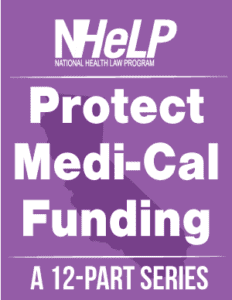 This post is part 2 of our 12-part “Protect Medi-Cal Funding” series. Medi-Cal provides a long-term investment that helps Californians succeed. This blog series highlights the importance of Medi-Cal for various populations in California.
This post is part 2 of our 12-part “Protect Medi-Cal Funding” series. Medi-Cal provides a long-term investment that helps Californians succeed. This blog series highlights the importance of Medi-Cal for various populations in California.
Women make up more than half of the 13.4 million Californians enrolled in Medi-Cal. Medicaid plays a particularly important role for low-income women. Nationwide, women are more likely than men to live in poverty and to be employed in low wage or part-time jobs that do not offer employer-based insurance. Medi-Cal provides these women with comprehensive health services, including physician visits, hospital care, preventive screenings, family planning services, and supplies, maternity care, and mental health services.
The American Health Care Act (AHCA), passed by the House of Representatives on May 4, proposes to cut Medicaid by $839 billion by converting the program into a per capita cap funding system. The AHCA is now in the hands of the Senate. If passed, this bill would decimate Medicaid funding and services for Californian women.
- Any federal funding cuts to Medicaid would require the state to make difficult choices with an underfunded Medi-Cal budget. In response, California may try to scale back Medi-Cal eligibility limits for specific populations, such as certain categories of pregnant women.
- Women currently make up 49 percent of the 3.7 Californians on Medi-Cal expansion coverage. Under the House GOP bill, Medicaid expansion would effectively end over time, as laid out in an NHeLP issue brief. Low-income childless adult women would once again be left out of life-saving Medi-Cal coverage.
- Medicaid cuts could also force the state to reduce access to optional programs that California’s women rely on, such as the Breast and Cervical Cancer Treatment Program or mental health care.
- Medicaid cuts could have a particularly devastating impact on already vulnerable populations of women, such as older women. Medi-Cal provides older women with many services to help maintain their independence, such as home health care and long term services and supports. Any potential reductions in Medi-Cal coverage, access, or services for older adults would have a disproportionate impact on older women, since on average older women live longer and have fewer resources and lower incomes than older men.
We urge you to read our Protect Medi-Cal Series, Issue Brief #2 for a deeper dive on how Medi-Cal benefits California’s women and how Medicaid cuts would endanger the health access, services, and care that millions of California’s women rely on every day. And for more, see our blog post about Medi-Cal and children’s health. Download issue brief here.